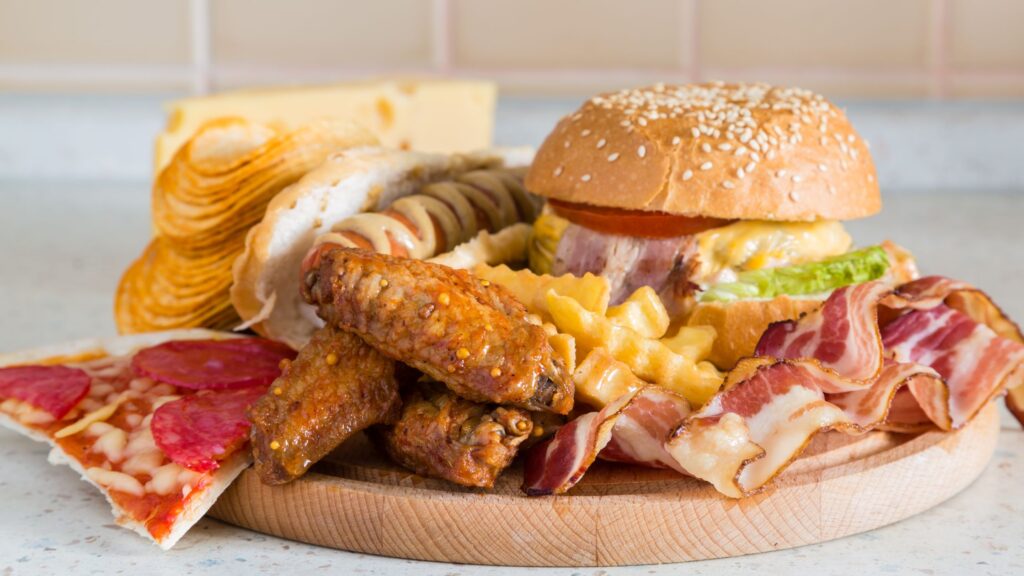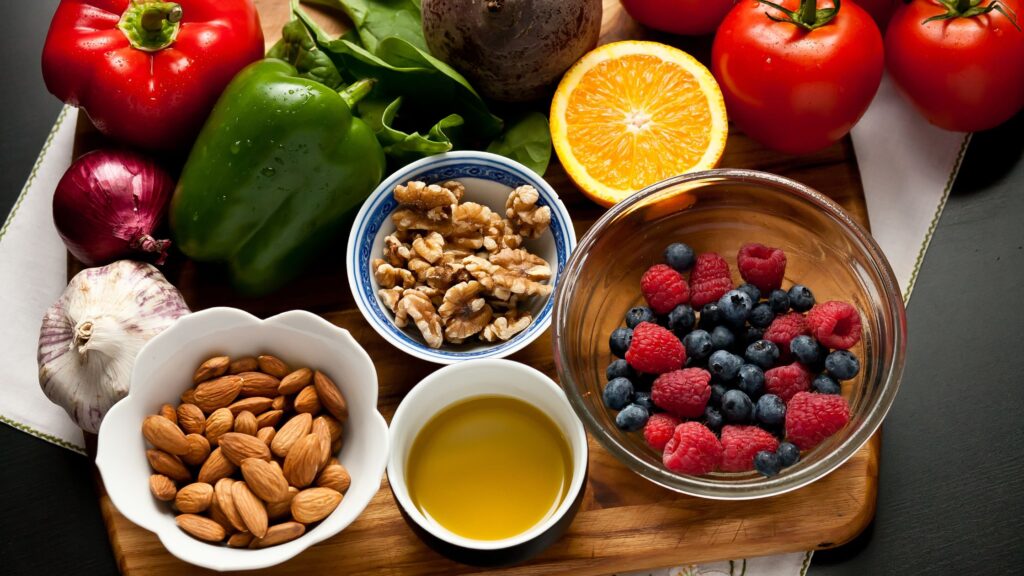Did you know that your diet could be contributing to your back pain? What you eat can have a significant impact on your overall health, including your bone mass and digestive condition. In fact, certain foods can trigger or worsen back pain symptoms, while others can help alleviate them. Making dietary changes and keeping a food diary can help identify problem foods and improve digestive issues that may be causing discomfort.
Evidence suggests that consuming dairy products, for example, may lead to inflammation and exacerbate existing back problems. On the other hand, incorporating fatty acids into your diet has been shown to reduce inflammation and potentially relieve back pain symptoms.
If you’re struggling with back pain, it’s worth consulting with a doctor or registered dietitian who can provide personalized tips on how to modify your diet and lifestyle changes that may help alleviate symptoms.

Understanding the Causes of Back Pain After Eating
Overeating and Pressure on the Spine
Overeating can lead to back pain as it puts pressure on the spine. When we consume too much food, our stomach expands, which can cause discomfort in the back. The pressure caused by overeating is especially problematic for those with existing back problems. Consuming large meals late at night can result in poor sleep quality, leading to further back pain.
Acid Reflux and Back Pain
Certain foods can cause acid reflux or heartburn that may lead to back pain. This is because acid reflux causes stomach acid to flow backward into the esophagus, causing irritation and inflammation that can radiate towards the back. Common culprits include spicy or greasy foods, chocolate, coffee, and alcohol.
Unhealthy Eating Habits and Digestive Issues
Poor digestion due to unhealthy eating habits can also contribute to back pain. Consuming high-fat foods or processed foods regularly can lead to gallbladder attacks or ulcer symptoms that may cause discomfort in the back. Underlying conditions such as stomach ulcers or heart problems may also result in referred pain in the back.
To avoid experiencing back pain after eating:
- Eat smaller meals throughout the day instead of one large meal.
- Avoid consuming large amounts of food before bedtime.
- Limit your intake of spicy or greasy foods.
- Cut down on processed foods and high-fat meals.
- Seek medical attention if you suspect an underlying condition causing your symptoms.
The Role of Inflammation in Back Pain
Understanding Inflammation and Back Pain
Inflammation is a natural response of the body to infection or injury. When you get injured, your immune system sends white blood cells to the affected area to fight off any harmful pathogens and begin the healing process. However, chronic inflammation can lead to various health problems, including back pain.
Chronic inflammation occurs when your immune system continues to release inflammatory chemicals even after an injury has healed or there is no infection present. This prolonged inflammatory response can damage healthy tissues and cause pain.
Foods that Cause Inflammation and Back Pain
Certain foods are known to trigger an inflammatory response in the body, leading to chronic inflammation and back pain. It’s essential to avoid these foods if you have chronic back pain:
- Processed meats: These contain high levels of saturated fats, which can increase inflammation in the body.
- Sugary drinks: Beverages like soda and fruit juices contain high amounts of fructose, which can trigger an inflammatory response.
- Refined carbohydrates: Foods made from refined flour like white bread, pasta, and pastries can increase inflammation in the body.
Anti-Inflammatory Foods for Alleviating Back Pain
On the other hand, some foods may help reduce inflammation in the body and alleviate back pain. These include:
- Fruits: Berries like strawberries and blueberries are rich in antioxidants that help reduce inflammation.
- Vegetables: Leafy greens like spinach and kale contain anti-inflammatory compounds that may help reduce back pain.
- Nuts: Walnuts, almonds, and other nuts are rich in omega-3 fatty acids that have anti-inflammatory properties.
Incorporating these anti-inflammatory foods into your diet may help alleviate chronic back pain caused by inflammation.

Proinflammatory vs Anti-inflammatory Foods for Back Pain Relief
Back pain is a common issue that affects millions of people worldwide. While there are many causes of back pain, including injury and muscle strain, diet can also play a significant role. In particular, certain foods can cause or exacerbate inflammation in the body, leading to increased back pain symptoms. On the other hand, some foods have anti-inflammatory properties that may help reduce inflammation and relieve back pain symptoms.
Proinflammatory Foods
Proinflammatory foods are those that promote inflammation in the body. These include fried foods, processed meats, refined sugar, and white flour products. For those with chronic back pain, these types of foods should be limited or avoided altogether as they can increase inflammation levels and worsen symptoms.
Anti-inflammatory Foods
Anti-inflammatory foods are those that help reduce inflammation in the body. Incorporating these types of foods into your diet may help alleviate back pain symptoms. Some examples of anti-inflammatory foods include:
- Fatty fish: Salmon, tuna, mackerel, and other fatty fish contain omega-3 fatty acids which have been shown to have anti-inflammatory effects.
- Leafy greens: Kale, spinach, collard greens and other leafy greens contain antioxidants like vitamin C which helps reduce oxidative stress on the body.
- Berries: Blueberries, raspberries and strawberries contain anthocyanins which have been shown to help reduce inflammation levels.
- Nuts: Almonds and walnuts contain healthy fats that can help reduce inflammation levels in the body.
- Whole grains: Brown rice and quinoa are whole grains containing fiber which has been shown to decrease inflammatory markers.
The Importance of Balance
While it’s important to limit proinflammatory foods when dealing with chronic back pain, it’s also important to maintain a balanced diet overall. Completely eliminating all proinflammatory foods from your diet is not recommended as they are still important sources of nutrients.
Foods to Avoid While Experiencing Back Pain
Back pain is a common problem that affects a significant number of people worldwide. Although many factors can cause back pain, certain foods have been shown to worsen the condition.
Spicy Food
Spicy food contains capsaicin, which gives it its characteristic heat. Capsaicin is known to aggravate existing inflammation in the body leading to increased discomfort from lower-back pains. Therefore, it’s best to avoid spicy food if you’re experiencing back pain.
Alcohol Consumption
Alcohol consumption causes dehydration, which leads to muscle cramps and severe lower-back pains. Alcohol can interfere with your sleep quality, making it harder for your body to recover from back pain.
High-Fat Dairy Products
High-fat dairy products such as cheese have been shown to increase inflammatory markers in some people leading to an increase in lower-back pains. Therefore, if you’re prone to back pain or are currently experiencing it, consider avoiding high-fat dairy products.
Red Meat
Red meat is high in saturated fats that can contribute to inflammation throughout the body. This inflammation can exacerbate existing back pain symptoms. If you’re experiencing back pain or are prone to it, consider reducing your intake of red meat.
Sugary Foods and White Bread
Sugary foods and white bread cause spikes in blood sugar levels that can lead to inflammation throughout the body. This inflammation can worsen existing back pain symptoms. Therefore, if you’re experiencing back pain or are prone to it, consider reducing your intake of sugary foods and white bread.
Vegetables
Certain vegetables like tomatoes and eggplants contain solanine – a chemical compound that has been linked with muscle spasms and joint pains in some people. If you experience these symptoms when consuming these vegetables or are currently experiencing back pain, it’s best to avoid them.
Identifying Food Intolerances or Allergies for Back Pain Relief
Trigger Foods and Intolerances
Did you know that certain foods can cause or worsen back pain? If you experience frequent back pain, it may be worth considering if your diet is contributing to the problem. Some people have food intolerances that cause inflammation, bloating, and other symptoms that lead to lower-back pains.
One common food intolerance is lactose intolerance. Lactose is a sugar found in milk and dairy products. Those with lactose intolerance cannot properly digest lactose, leading to bloating and gas. This bloating puts pressure on the spine leading to lower-back pains.
Gluten intolerance has also been linked with joint-pain including lower-back pains. Gluten is a protein found in wheat, barley, rye, and some other grains. Those with gluten intolerance cannot properly digest gluten which causes an inflammatory response in the body resulting in joint pain.
Other trigger foods that can cause inflammation include bread, pastries, refined grains (such as white rice), potatoes, corn and other processed foods.
Food Allergies
Food allergies can also be a culprit of back pain. A shellfish allergy could cause inflammation in the body leading to severe back pain. Other common allergens such as peanuts or tree nuts could also lead to inflammation throughout the body.
It’s important to note that food intolerances are different from food allergies. While intolerances affect digestion causing discomforts like bloating or gas; allergies are more severe reactions by the immune system which could lead to hives, difficulty breathing or even anaphylaxis.
Gallbladder Problems
In addition to food intolerances and allergies causing back pain; gallbladder problems may also contribute to this issue. The gallbladder is located near the liver on the right side of your abdomen. It stores bile which helps break down fats during digestion.
An Anti-inflammatory Diet as a Potential Solution for Back Pain Relief
In conclusion, an anti-inflammatory diet can be a potential solution for back pain relief caused by certain foods. Understanding the causes of back pain after eating and the role of inflammation in it can help identify proinflammatory and anti-inflammatory foods. Avoiding trigger foods, identifying food intolerances or allergies, maintaining good posture, and exercising regularly are also crucial for managing back pain.
To reduce inflammation and alleviate back pain, try incorporating more anti-inflammatory foods such as leafy greens, fatty fish, nuts, and berries into your diet. On the other hand, avoid or limit proinflammatory foods like processed snacks, sugary drinks, red meat, and refined carbs.
Remember to consult with a healthcare professional before making any significant changes to your diet or exercise routine. By taking care of your body through proper nutrition and lifestyle habits, you can minimize the risk of experiencing back pain caused by certain foods.
